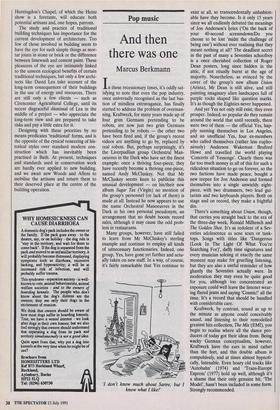Pop music
And then there was one
Marcus Berkmann
In these recessionary times, it's oddly sat- isfying to note that even the pop industry, once universally recognised as the last bas- tion of mindless extravagance, has finally started to address the problem of overman- ning. Kraftwerk, for many years made up of four grim Germans pretending to be robots, are now just two grim Germans pretending to be robots ŌĆö the other two have been fired and, if the group's recent videos are anything to go by, replaced by real robots. But, perhaps surprisingly, it's the Liverpudlian group Orchestral Man- oeuvres in the Dark who have set the finest example: once a thriving four-piece, they have recently become a thriving one-piece, named Andy McCluskey. Not that Mr McCluskey seems keen to publicise this unusual development ŌĆö on his/their new album Sugar Tax (Virgin) no mention of the group's personnel (or lack of them) is made at all. Instead he now appears to use the name Orchestral Manoeuvres in the Dark as his own personal pseudonym, an arrangement that no doubt boosts record sales, although it may cause the odd prob- lem in restaurants.
Many groups, however, have still failed to learn from Mr McCluskey's sterling example and continue to employ all kinds of unnecessary functionaries. Indeed, one group, Yes, have gone yet further and actu- ally taken on new staff. In a way, of course, it's fairly remarkable that Yes continue to
'I don't know much about Sartre, but 1 know what I like!'
exist at all, so transcendentally unfashion- able have they become. Is it only 15 years since we all endlessly debated the meanings of Jon Anderson's lyrics ('On the back of your 40-second screamdown/Do you choose to be lost 'midst the challenge of being one') without ever realising that they meant nothing at all? The deadliest secret in the past of many a Seventies schoolboy is a once cherished collection of Roger Dean posters, long since hidden in the attic, if not ritually burnt at the age of majority. Nonetheless, as evinced by the cover of the group's new album Union (Arista), Mr Dean is still alive, and still painting imaginary alien landscapes full of purple rocks shaped like question marks. It's as though the Eighties never happened.
And yet Yes not only still exist, they even prosper. Indeed, so popular do they remain around the world that until recently, there were two of them ŌĆö the official Yes, hap- pily sunning themselves in Los Angeles, and an unofficial Yes, four ex-members who called themselves (rather less eupho- niously) Anderson Wakeman Bruford Howe and travelled the world playing 'Concerts of Yessongs'. Clearly there was far too much money in all of this for such a ridiculous situation to go on forever, so the two factions have made peace, bought a new teepee for Jon Anderson and formed themselves into a single unwieldy eight- piece, with two drummers, two lead gui- tarists and two keyboards players. Both on stage and on record, they make a frightful din.
There's something about Union, though, that carries you straight back to the era of the three-day week, Ronald Milhench and The Golden Shot. It's as redolent of a Sev- enties adolescence as acne scars or tank- tops. Songs with titles like 'Dangerous (Look In The Light Of What You're Searching For)', daffy time signatures and every musician soloing at exactly the same moment may make for gruelling listening, but they are also a useful reminder of how ghastly the Seventies actually were. In moderation they may even be quite good for you, although too concentrated an exposure could well leave the listener wear- ing flared jeans and saying 'Cosmic!' all the time. It's a record that should be handled with considerable care.
Kraftwerk, by contrast, sound as up to the minute as anyone could conceivably sound, and listening to their remodelled greatest hits collection, The Mix (EMI), you begin to realise where all the dance pro- ducers of today got their ideas from. Being wacky German conceptualists, however, Kraftwerk have the ears in mind rather than the feet, and this double album is compulsively, and at times almost hypnoti- cally, listenable. Even hoary old tracks like 'Autobahn' (1974) and 'Trans-Europe Express' (1977) hold up well, although it's a shame that their only genuine hit, 'The Model', hasn't been included in some form. Strongly recommended.


















































 Previous page
Previous page